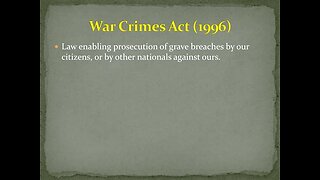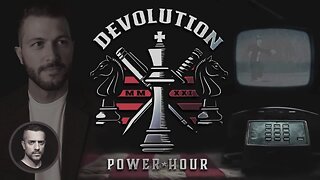Premium Only Content

“Lucky 13”, FEDERAL RESERVE ACT Section 13 -13
“Lucky 13” = 12 Disciples + ONE!
Sec. 13 FEDERAL RESERVE ACT
[13. Advances to individuals, partnerships, and corporations on direct obligations of the United States]
Subject to such limitations, restrictions and regulations as the Board of Governors of the Federal Reserve System may prescribe, any Federal reserve bank may make advances to any individual, partnership or corporation on the promissory notes of such individual, partnership or corporation secured by direct obligations of the United States or by any obligation which is a direct obligation of, or fully guaranteed as to principal and interest by, any agency of the United States. Such advances shall be made for periods not exceeding 90 days and shall bear interest at rates fixed from time to time by the Federal reserve bank, subject to the review and determination of the Board of Governors of the Federal Reserve System. [12 U.S.C. 347c]
The sworn testimony of Walker F. Todd, former legal counsel and assistant general counsel to the Federal Reserve Bank of New York and research officer at the Federal Reserve Bank of Cleveland.
In his affidavit, Todd states:
“Instead of the bank lending its money or other assets to the customer, as the customer reasonably might believe… the bank created funds for the customer’s transaction account without the customer’s permission, authorization, or knowledge, and delivered the credit on its own books…”
Todd further explains that:
“No lawful money was or probably ever would be disbursed by either side in the covered transactions… At most, the Plaintiff extended its own credit (money of account), but the Defendants were required to repay in money (money of exchange)...creating an inequality of obligations.”
— Affidavit of Walker F. Todd, submitted in Oakland County Circuit Court, Michigan, Case No. 03-047448-CZ (2004).
When the note is sold with the security, and the bank ‘keeps the note just as custodian’ for a third party, The note is bifurcated/separated from the deed of trust, and the lien is void under Carpenter v Longen (US Supreme 1872)
IMPORTANT: ASSIGNMENTS INVALID
It is highly feasible that Johnson will succeed on the merits. The United States Supreme Court decision in Carpenter v. Longan, 83 U.S. 271, 274 (1872) “The note and mortgage are inseparable; the former as essential, the latter as an incident. An assignment of the note carries the mortgage with it, while an assignment of the latter alone is a nullity.”
Pursuant to the United States Supreme Court decisions Florida First District Court of Appeal in Sobel v. Mutual Development, Inc., 313 So. 2d 77 (Fla. App. 1st Dist. 1975) “A mortgage is a mere incident of, and ancillary to, the note or other obligation secured thereby, and an assignment of the pledge of the mortgage without an assignment of the pledge of the note or obligation secured thereby creates no right in the assignee or pledgee” and ten (10) years prior a decision with the same result in Vance v. Fields, 172 So. 2d 613, 614 (Fla. 1st DCA 1965) “An assignment of the mortgage without an assignment of the debt creates no right in the assignee.”
UNENFORCEABLE CONTRACT
The Statute of Frauds is part of the Uniform Commercial Code, known as the “UCC.” The UCC is a model statute that has been adopted by the majority of states in the United States. In most cases, it is used to resolve contract disputes over the sale of goods. The Statute of Frauds statute enacted may vary from state to state, but most are similar to the UCC.
There are certain elements each written contract should contain. These will vary from state to state but generally must include the following elements:
• Identification information of both parties entering into the contract;
• Reasonably identifiable subject matter;
• Clearly stated fundamental terms and conditions; and
• Signatures of all parties to the agreement.
Man can contract with man.
When plunder becomes a societal norm, the legal system is manipulated to allow or even promote it. Similarly, the moral code of the society is twisted to justify the theft, often by framing it as a justifiable or even noble act.
“What goes around comes around”
King James Version (KJV) Galatians 6:7
“Be not deceived; God is not mocked: for whatsoever a man soweth, that shall he also reap.”
-
 15:46
15:46
Humble on Rumble
5 days agoTo the Supreme Court - Title 18 U.S. Code 2441 War Crimes...
50 -
 11:37
11:37
The Pascal Show
13 hours agoTHEY WANT TO END HER?! Candace Owens Claims French President & First Lady Put A H*t Out On Her?!
4.88K2 -
 LIVE
LIVE
Lofi Girl
2 years agoSynthwave Radio 🌌 - beats to chill/game to
259 watching -
 24:30
24:30
DeVory Darkins
14 hours agoMarjorie Taylor Greene RESIGNS as Minnesota dealt MAJOR BLOW after fraud scheme exposed
66.5K115 -
 2:19:48
2:19:48
Badlands Media
1 day agoDevolution Power Hour Ep. 409: Panic in the Narrative — Epstein, Israel, and the Manufactured Meltdowns
161K42 -
 1:52:38
1:52:38
Man in America
11 hours agoCommunists VS Zionists & the Collapse of the American Empire w/ Michael Yon
65.3K30 -
 4:09:34
4:09:34
Akademiks
6 hours agoSheck Wes exposes Fake Industry. Future Not supportin his mans? D4VD had help w disposing his ex?
42.2K3 -
 6:43:43
6:43:43
SpartakusLIVE
10 hours agoTeam BUNGULATORS || From HUGE WZ DUBS to TOXIC ARC BETRAYALS
115K3 -
 2:44:56
2:44:56
BlackDiamondGunsandGear
6 hours agoAre You that guy? / Carrying a Pocket Pistol /After Hours Armory
27.1K -
 5:41:59
5:41:59
Camhigby
6 hours agoLIVE - Riot Watch Portland, DC, NC
30.1K20